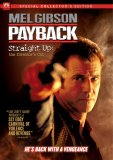| Reviews & Columns |
|
Reviews DVD TV on DVD Blu-ray 4K UHD International DVDs In Theaters Reviews by Studio Video Games Features Collector Series DVDs Easter Egg Database Interviews DVD Talk Radio Feature Articles Columns Anime Talk DVD Savant Horror DVDs The M.O.D. Squad Art House HD Talk Silent DVD
|
DVD Talk Forum |
|
|
| Resources |
|
DVD Price Search Customer Service #'s RCE Info Links |
|
Columns
|
|
|
Payback - The Director's Cut
Paramount // Unrated // April 10, 2007
List Price: $19.99 [Buy now and save at Amazon]
Early 21st century has seen a myriad of revenge flicks. Maybe it's a carnal desire within all people to seek revenge. Film might serve as a vicarious medium for enjoying this carnal desire. Before Uma slashed her way through Kill Bill and Oh Dae-Su hammered through Oldboy, Mel Gibson's Porter plunked and conned in Brian Helgeland's Payback. Though the final vision plays out as an above-average volume in the genre, it wasn't exactly what Helgeland had in mind for his version of the film.
Payback: Straight Up is quite the fitting name for this work. Imagine the blue filter stripped away, the score completely revamped, and the entire third act scrapped for the originally filmed conclusion. The tracks are then laid for this alternate cut. With some dialogue tweaking and additional scenes, Helgeland's version of the film starts to flesh out. As mentioned before, the "straight-up" connotation is completely accurate: picture this film like a solid shot of tequila, while the theatrical cut is a stiff, colorful margarita. Though it's quicker and still quite strong, Payback: Straight Up ditches the rich panache and flavor of the theatrical's attributes in lieu of an attempt to increase potency.
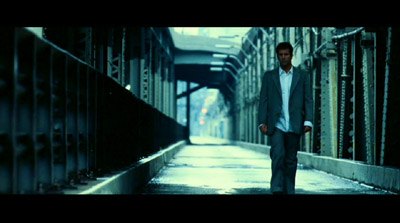
The Film:
Payback is a tale about revenge sought, money accounted for, and the principles of the matter. It's a tale about death and corruption for seventy-thousand dollars. More importantly, Payback is about how a battered and bruised con-artist named Porter (Mel Gibson) rakes back into his haphazard life to accomplish his own animalistic, driven desire for vengeance. Like a vampire searching for both a cure and blood to satiate the desire, Porter makes absolute certain to tear through just about anyone blocking him from what's rightfully his.
Set in a cold, concrete-laden world fuming with corruption, it's easy to stand behind a semi-corrupt man fighting to tear it all down for any reason. Testosterone-pumping alpha males strut confidently amidst this web of organized crime, from taxi dispatchers dabbling in heroine to the crooked cops shrouded with gambling and bribery. This entire fandango of crime seems firmly rooted within an organization known only as The Outfit. Everyone with a blackened heart wishes to have a piece of the Outfit's pie, especially an ostracized member named Val Resnick (Gregg Henry). It's amazing what showing a photograph of Porter and another woman (Maria Bello as Rosie) can do to a wife (Deborah Unger)'s rage.
Val would start a connection of backstabs that would land the fallen anti-hero Porter penniless, wifeless, and sporting more than a few wounds. Every penny Val burned Porter for would go towards his re-entry into the crime syndicate. What Val didn't plan on was Porter's survival amidst this horrid mess. To reclaim what was his, Porter must track down ole' Resnick and crowbar the cash from the insurmountable legion of thugs plaguing the city. To say the least, the journey wouldn't be easy. Thankfully, the town seems to cower underneath Porter's rock-solid foot.
Gibson's Porter is a show-stealer to the highest order, which is par-for-the-course since he's the sun amidst these revolving acts. His natural charisma surfaces repeatedly underneath Porter's scruff exterior, lending an air of pleasant grit as he tears through the city. Most of the supporting cast trot along with him and his velocity; however, one truly stand-out performance from Maria Bello shines amidst the darkness Porter exhumes.
Payback jams together noir-ish grittiness with fantastically dark tongue-and-cheek humor. Dancing between the two creates an incarnation that's heavy and grating while also being undemanding and pleasant. This simple, engaging story rolls with the punches and hits rough patches with grace. Payback is enjoyable without being intrusive.
Director's Cut:
(left = Theatrical, right = Straight Up)
Note: Not exact frames.
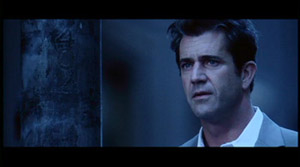
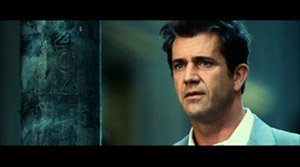
Needless to say, this Payback: Straight Up director's edition is aesthetically and conceptually a different flavor.
From the start, it's quite obvious that the crisp, blue bleach process has been "removed" from the print. "Removed" means that the bleach process wasn't initially implemented on the original negative this time around, thus presenting Payback in the film's natural color palette. Instead of leaning towards the stale, chilly indigo shades, this new rendition is flooded with industrial tans and browns influxed with stony teals. To say the least, the original print is vivaciously fluid with color. Flesh tones are reinstated, while minute details on walls and scenery are brought to lurid life. This decision is neither better nor worse, just an alternative. Personally, the crisp, empty blues of the original print conveyed the shallow heartlessness of the scenario quite well. Overall warmth now pours through the film with this new, absolutely striking transfer. To say the difference is night and day is both a figurative and literal statement. With this, the tone of Payback starts to shift as well.
Continuing with this shift is the addition of a brand-new score crafted specifically for this Payback: Straight Up edition. When trying to snip and remix the film, it became obvious that the score for the theatrical cut had to be scrapped. That's a true shame, because it's a royally sweet aural onslaught. One vivid scene recalled from memory is when Val stands roadside ready to meet Porter while accompanied by the gritty, sharp riffs of Jimi Hendrix' "Voodoo Child". Out steps Porter right as the song's persistent overdrive kicks into gear. This, along with numerous other memorable accompaniments, has been emptied from the presentation. Also swiped clean from the presentation are the insightful, noir-ish voiceovers from Gibson. Any internal dialogue is left to the imagination this time around. Instead of this brash aural presentation, a fresh composer Scott Stambler has been brought on to craft a new score lightly inspired from the old tracks. This new musical addition is another step towards a brighter, more vibrant version of Payback. Instead of a chorus of heavy, throbbing '70s inspired tracks, this new score is a smoother, cleaner addition. Opting for a few more traditional, modern chords, Payback now flows along with a very mild vintage inspiration. It's a gorgeous score, rich with ravishingly melodic timing.
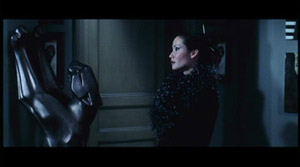
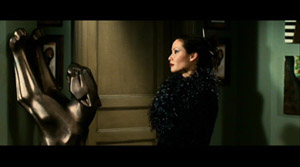
Where the discrepancies lay with Helgeland and his vision of Payback is within a myriad of elements in the original content, not the aesthetics. Payback: Straight Up laces these original ideas back within his own original narrative. Many points have been added, while other snips and changes have whittled the film down smaller as well. After this total reconstruction, roughly ten minutes are shaved off the original run-time. The most noticeable difference lies within the changes made within the final act. How is it different? The entire final act has been completely flushed away to make way for Helgeland's original intended climax. Here's an example as to how this difference really impacts the concluding stride as opposed to the theatrical version: Kris Kristofferson isn't in Payback: Straight Up. Not once.
Including this new finale, the changes made throughout the film revamp a large portion of the demeanor crafted for the theatrical cut. A couple of completely removed sequences are wedged back into the film, such as a particularly potent confrontation between Porter and his wife that would have beefed up the first few minutes of theatrical cut wonderfully. More dialogue is ushered in involving Rosie and Porter's past relationship, building upon many elements left to interpretation from the original cut. Numerous assumptions crafted in the prior release of the film are knocked down and contorted for this new edition. For better or worse, a few more plot eccentricities become straight forward and clear; conversely, more information about Porter has been ushered out and left for re-interpretation. Some of the alterations might leave a sour taste, while others shine as seamless and pleasant additions.
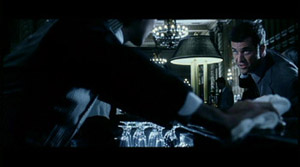
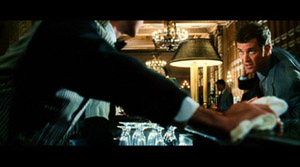
Lying somewhere between the theatrical cut of Payback and this Straight Up cut lies a great revenge film. If the core story was infused with the prominent flesh and bones of both renditions, then the sky might be the limit of its potential. However, split across the two differing visions, each side has distinctive positives and negatives that propel both slamming against the ceiling as marginally above-average films. The theatrical cut of Payback is an enjoyable, aesthetically gritty tongue-and-cheek noir. Something about the cold, subdued image helps convey the soulless behavior rattling amidst the crime syndicate.
In contrast, Straight Up scrapes away these signature aesthetics for a handsome, interpretive character-study that gracefully fizzles at the end instead of clanking heavily in Hollywood fashion. Though some of these new additions don't seem exceedingly cohesive with the film's character, they do add a new variety of flavors to this entertaining piece. Amidst the same narrative and tone crafted by Helgeland, this film is undoubtedly "same story, different movie", giving a fresh vision into Porter and his dire thirst for revenge. Payback: Straight Up may not be a superior reincarnation of its theatrical predecessor, but it's a worthy film that Helgeland can be proud of.
The DVD:
Payback: Straight Up is presented in a standard keepcase DVD. Inside, the DVD is typical Paramount, shimmering with a gleaming silver discart and no chapter listing.
The Video:
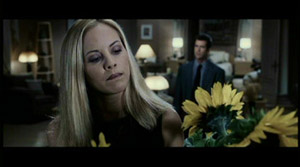
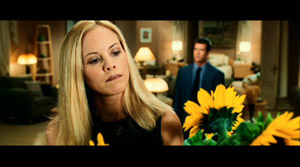
There isn't anything particularly dreadful about Payback's theatrical cut DVD. Sure, it's fairly grainy, suffers from edge enhancement here and there, and experiences recurring dust and scratches. However, the detail was sharp and the subdued slate colors were pretty solid.
Payback: Straight Up, however, is absolutely gorgeous. This film is presented in an anamorphic widescreen image preserving the expansive negative. Instead of this cold arrangement of navy shades, this palette relentlessly attacks the screen with radiant color. Once again, outdoor scenes lean further towards a mildly subdued palette. However, even amidst these scenes, the flush colors are radiant. It's once Porter steps inside the confines of the lush Outfit building and Rosie's apartment, however, that the smattering of colors is enchanting. In fact, these colors are so overwhelming enchanting that the negative appears a shade on the oversaturated side. A minor detail here and there gets swallowed up from the sumptuous colors. Even amidst this fluent saturation, detail is incredibly strong. Edge enhancement didn't seem to rear its ugly head too noticeably, but there does appear to be a very sporadic color bleeding here and there that's hardly visible when watching the film. Even amidst these select blemishes, this is a transfer that really shines.
The Audio:
Once again, Payback: Straight Up is presented in a very strong Dolby Digital 5.1 audio. With a new visual style also comes a new aural style. Both versions of Payback rely heavily upon an entrancing myriad of music that takes Porter strolling from point to point. This aural presentation makes avid use of the surround channels, stretching the urban sound effects across the entire parameter with solid effectiveness. The subwoofer channel was used well, though not to any noticeable lengths. The dialogue echoing amongst thieves rang through crisp and clean. A Dolby 2.0 audio track is also available, as well as English subtitles.
The Extras:
Considering this DVD is an altered version of an established film, there's got to be a bit of explaining to do. Fortunately, Brian Helgeland is fully up to the task and includes his share of explanations in the Bonus Material for Straight Up:
The best feature is the "Same Story, Different Movie" featurette that gives a ramshackle breakdown of the differences in each edition. Commentary from Helgeland and his production partners fill the run-time, including some great commentary from a beard-laden Gibson. It illustrates exactly how and why the film was edited and tailored for a more adaptable audience. This little piece alone would be a great accompaniment with the theatrical DVD.
A Director's Commentary featuring Helgeland can be chosen to accompany the feature presentation. Helgeland likes to concentrate firmly on the activities occurring real-time during the film. He also, however, likes to give quick quips about important moments that occur near the end of the film as well. It's a relatively interesting, albeit subdued listen featuring some glimmers of depth and insight.
The Hunter: A Conversation with Author Donald Westlake delves a bit into the ongoing character of Parker/Porter and the original conclusions with "The Hunter". It's a fairly lengthy conversation that shows the author's fondness to the character and his persona.
Paybacks are a Bitch: On Location in Chicago and San Francisco is split up individually between the two cities cities. However, the shooting locations are relatively meaningless points. Instead of concentrating much on the actual shooting problems associated with each location, they serve more as a mosaic of the production process while the filmmakers discuss Payback's conception. The content they speak about is actually pretty darn insightful. Everybody gets a few words in, from Gibson to Richard Donner, Helgeland's pseudo-mentor. This is more of a full-blown "Making Of" featurette that merely an on-site expose.
Honestly, this disc is nearly worth the price of admission for a fan of Payback due to the extra material. The overall commentary from all parties displays a genuine, albeit overly saccharine praise. It's a great myriad of extras stacked onto a beautifully rendered film.
-----
Final Thoughts:
Both theatrical and director's cuts of Payback are strong films worth seeing. Porter's slick, coarse trip along either road of revenge grips the audience within the script's rough-and-tumble narrative. Each version of the film should be enjoyed for their equal, respective high-quality points. In that respect, Payback: Straight Up comes easily Recommended as an engaging, alternate insight on Helgeland's intended directorial debut. At the very least, the extra materials will serve any Payback theatrical cut fan quite well. This is a great accompaniment disc for the original as a display of how starkly different two visions of the same film can be.
Thomas Spurlin, Staff Reviewer -- DVDTalk Reviews | Personal Blog/Site
Payback: Straight Up is quite the fitting name for this work. Imagine the blue filter stripped away, the score completely revamped, and the entire third act scrapped for the originally filmed conclusion. The tracks are then laid for this alternate cut. With some dialogue tweaking and additional scenes, Helgeland's version of the film starts to flesh out. As mentioned before, the "straight-up" connotation is completely accurate: picture this film like a solid shot of tequila, while the theatrical cut is a stiff, colorful margarita. Though it's quicker and still quite strong, Payback: Straight Up ditches the rich panache and flavor of the theatrical's attributes in lieu of an attempt to increase potency.

The Film:
Payback is a tale about revenge sought, money accounted for, and the principles of the matter. It's a tale about death and corruption for seventy-thousand dollars. More importantly, Payback is about how a battered and bruised con-artist named Porter (Mel Gibson) rakes back into his haphazard life to accomplish his own animalistic, driven desire for vengeance. Like a vampire searching for both a cure and blood to satiate the desire, Porter makes absolute certain to tear through just about anyone blocking him from what's rightfully his.
Set in a cold, concrete-laden world fuming with corruption, it's easy to stand behind a semi-corrupt man fighting to tear it all down for any reason. Testosterone-pumping alpha males strut confidently amidst this web of organized crime, from taxi dispatchers dabbling in heroine to the crooked cops shrouded with gambling and bribery. This entire fandango of crime seems firmly rooted within an organization known only as The Outfit. Everyone with a blackened heart wishes to have a piece of the Outfit's pie, especially an ostracized member named Val Resnick (Gregg Henry). It's amazing what showing a photograph of Porter and another woman (Maria Bello as Rosie) can do to a wife (Deborah Unger)'s rage.
Val would start a connection of backstabs that would land the fallen anti-hero Porter penniless, wifeless, and sporting more than a few wounds. Every penny Val burned Porter for would go towards his re-entry into the crime syndicate. What Val didn't plan on was Porter's survival amidst this horrid mess. To reclaim what was his, Porter must track down ole' Resnick and crowbar the cash from the insurmountable legion of thugs plaguing the city. To say the least, the journey wouldn't be easy. Thankfully, the town seems to cower underneath Porter's rock-solid foot.
Gibson's Porter is a show-stealer to the highest order, which is par-for-the-course since he's the sun amidst these revolving acts. His natural charisma surfaces repeatedly underneath Porter's scruff exterior, lending an air of pleasant grit as he tears through the city. Most of the supporting cast trot along with him and his velocity; however, one truly stand-out performance from Maria Bello shines amidst the darkness Porter exhumes.
Payback jams together noir-ish grittiness with fantastically dark tongue-and-cheek humor. Dancing between the two creates an incarnation that's heavy and grating while also being undemanding and pleasant. This simple, engaging story rolls with the punches and hits rough patches with grace. Payback is enjoyable without being intrusive.
Director's Cut:
(left = Theatrical, right = Straight Up)
Note: Not exact frames.


Needless to say, this Payback: Straight Up director's edition is aesthetically and conceptually a different flavor.
From the start, it's quite obvious that the crisp, blue bleach process has been "removed" from the print. "Removed" means that the bleach process wasn't initially implemented on the original negative this time around, thus presenting Payback in the film's natural color palette. Instead of leaning towards the stale, chilly indigo shades, this new rendition is flooded with industrial tans and browns influxed with stony teals. To say the least, the original print is vivaciously fluid with color. Flesh tones are reinstated, while minute details on walls and scenery are brought to lurid life. This decision is neither better nor worse, just an alternative. Personally, the crisp, empty blues of the original print conveyed the shallow heartlessness of the scenario quite well. Overall warmth now pours through the film with this new, absolutely striking transfer. To say the difference is night and day is both a figurative and literal statement. With this, the tone of Payback starts to shift as well.
Continuing with this shift is the addition of a brand-new score crafted specifically for this Payback: Straight Up edition. When trying to snip and remix the film, it became obvious that the score for the theatrical cut had to be scrapped. That's a true shame, because it's a royally sweet aural onslaught. One vivid scene recalled from memory is when Val stands roadside ready to meet Porter while accompanied by the gritty, sharp riffs of Jimi Hendrix' "Voodoo Child". Out steps Porter right as the song's persistent overdrive kicks into gear. This, along with numerous other memorable accompaniments, has been emptied from the presentation. Also swiped clean from the presentation are the insightful, noir-ish voiceovers from Gibson. Any internal dialogue is left to the imagination this time around. Instead of this brash aural presentation, a fresh composer Scott Stambler has been brought on to craft a new score lightly inspired from the old tracks. This new musical addition is another step towards a brighter, more vibrant version of Payback. Instead of a chorus of heavy, throbbing '70s inspired tracks, this new score is a smoother, cleaner addition. Opting for a few more traditional, modern chords, Payback now flows along with a very mild vintage inspiration. It's a gorgeous score, rich with ravishingly melodic timing.


Where the discrepancies lay with Helgeland and his vision of Payback is within a myriad of elements in the original content, not the aesthetics. Payback: Straight Up laces these original ideas back within his own original narrative. Many points have been added, while other snips and changes have whittled the film down smaller as well. After this total reconstruction, roughly ten minutes are shaved off the original run-time. The most noticeable difference lies within the changes made within the final act. How is it different? The entire final act has been completely flushed away to make way for Helgeland's original intended climax. Here's an example as to how this difference really impacts the concluding stride as opposed to the theatrical version: Kris Kristofferson isn't in Payback: Straight Up. Not once.
Including this new finale, the changes made throughout the film revamp a large portion of the demeanor crafted for the theatrical cut. A couple of completely removed sequences are wedged back into the film, such as a particularly potent confrontation between Porter and his wife that would have beefed up the first few minutes of theatrical cut wonderfully. More dialogue is ushered in involving Rosie and Porter's past relationship, building upon many elements left to interpretation from the original cut. Numerous assumptions crafted in the prior release of the film are knocked down and contorted for this new edition. For better or worse, a few more plot eccentricities become straight forward and clear; conversely, more information about Porter has been ushered out and left for re-interpretation. Some of the alterations might leave a sour taste, while others shine as seamless and pleasant additions.


Lying somewhere between the theatrical cut of Payback and this Straight Up cut lies a great revenge film. If the core story was infused with the prominent flesh and bones of both renditions, then the sky might be the limit of its potential. However, split across the two differing visions, each side has distinctive positives and negatives that propel both slamming against the ceiling as marginally above-average films. The theatrical cut of Payback is an enjoyable, aesthetically gritty tongue-and-cheek noir. Something about the cold, subdued image helps convey the soulless behavior rattling amidst the crime syndicate.
In contrast, Straight Up scrapes away these signature aesthetics for a handsome, interpretive character-study that gracefully fizzles at the end instead of clanking heavily in Hollywood fashion. Though some of these new additions don't seem exceedingly cohesive with the film's character, they do add a new variety of flavors to this entertaining piece. Amidst the same narrative and tone crafted by Helgeland, this film is undoubtedly "same story, different movie", giving a fresh vision into Porter and his dire thirst for revenge. Payback: Straight Up may not be a superior reincarnation of its theatrical predecessor, but it's a worthy film that Helgeland can be proud of.
The DVD:
Payback: Straight Up is presented in a standard keepcase DVD. Inside, the DVD is typical Paramount, shimmering with a gleaming silver discart and no chapter listing.
The Video:


There isn't anything particularly dreadful about Payback's theatrical cut DVD. Sure, it's fairly grainy, suffers from edge enhancement here and there, and experiences recurring dust and scratches. However, the detail was sharp and the subdued slate colors were pretty solid.
Payback: Straight Up, however, is absolutely gorgeous. This film is presented in an anamorphic widescreen image preserving the expansive negative. Instead of this cold arrangement of navy shades, this palette relentlessly attacks the screen with radiant color. Once again, outdoor scenes lean further towards a mildly subdued palette. However, even amidst these scenes, the flush colors are radiant. It's once Porter steps inside the confines of the lush Outfit building and Rosie's apartment, however, that the smattering of colors is enchanting. In fact, these colors are so overwhelming enchanting that the negative appears a shade on the oversaturated side. A minor detail here and there gets swallowed up from the sumptuous colors. Even amidst this fluent saturation, detail is incredibly strong. Edge enhancement didn't seem to rear its ugly head too noticeably, but there does appear to be a very sporadic color bleeding here and there that's hardly visible when watching the film. Even amidst these select blemishes, this is a transfer that really shines.
The Audio:
Once again, Payback: Straight Up is presented in a very strong Dolby Digital 5.1 audio. With a new visual style also comes a new aural style. Both versions of Payback rely heavily upon an entrancing myriad of music that takes Porter strolling from point to point. This aural presentation makes avid use of the surround channels, stretching the urban sound effects across the entire parameter with solid effectiveness. The subwoofer channel was used well, though not to any noticeable lengths. The dialogue echoing amongst thieves rang through crisp and clean. A Dolby 2.0 audio track is also available, as well as English subtitles.
The Extras:
Considering this DVD is an altered version of an established film, there's got to be a bit of explaining to do. Fortunately, Brian Helgeland is fully up to the task and includes his share of explanations in the Bonus Material for Straight Up:
The best feature is the "Same Story, Different Movie" featurette that gives a ramshackle breakdown of the differences in each edition. Commentary from Helgeland and his production partners fill the run-time, including some great commentary from a beard-laden Gibson. It illustrates exactly how and why the film was edited and tailored for a more adaptable audience. This little piece alone would be a great accompaniment with the theatrical DVD.
A Director's Commentary featuring Helgeland can be chosen to accompany the feature presentation. Helgeland likes to concentrate firmly on the activities occurring real-time during the film. He also, however, likes to give quick quips about important moments that occur near the end of the film as well. It's a relatively interesting, albeit subdued listen featuring some glimmers of depth and insight.
The Hunter: A Conversation with Author Donald Westlake delves a bit into the ongoing character of Parker/Porter and the original conclusions with "The Hunter". It's a fairly lengthy conversation that shows the author's fondness to the character and his persona.
Paybacks are a Bitch: On Location in Chicago and San Francisco is split up individually between the two cities cities. However, the shooting locations are relatively meaningless points. Instead of concentrating much on the actual shooting problems associated with each location, they serve more as a mosaic of the production process while the filmmakers discuss Payback's conception. The content they speak about is actually pretty darn insightful. Everybody gets a few words in, from Gibson to Richard Donner, Helgeland's pseudo-mentor. This is more of a full-blown "Making Of" featurette that merely an on-site expose.
Honestly, this disc is nearly worth the price of admission for a fan of Payback due to the extra material. The overall commentary from all parties displays a genuine, albeit overly saccharine praise. It's a great myriad of extras stacked onto a beautifully rendered film.
-----
Final Thoughts:
Both theatrical and director's cuts of Payback are strong films worth seeing. Porter's slick, coarse trip along either road of revenge grips the audience within the script's rough-and-tumble narrative. Each version of the film should be enjoyed for their equal, respective high-quality points. In that respect, Payback: Straight Up comes easily Recommended as an engaging, alternate insight on Helgeland's intended directorial debut. At the very least, the extra materials will serve any Payback theatrical cut fan quite well. This is a great accompaniment disc for the original as a display of how starkly different two visions of the same film can be.
|
| Popular Reviews |
| Sponsored Links |
|
|
| Sponsored Links |
|
|
| Release List | Reviews | Shop | Newsletter | Forum | DVD Giveaways | Blu-Ray | Advertise |
|
Copyright 2024 DVDTalk.com All Rights Reserved. Legal Info, Privacy Policy, Terms of Use,
Manage Preferences,
Your Privacy Choices | |||||||









